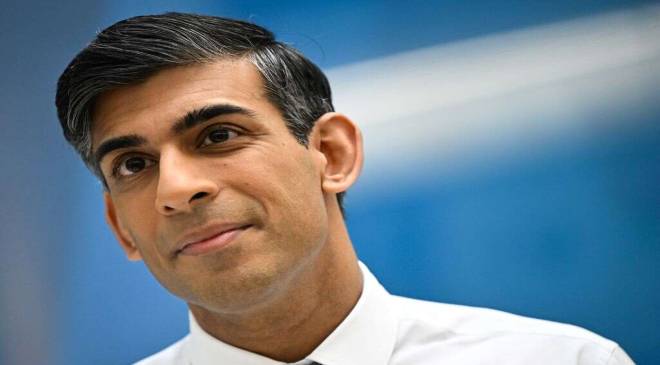If 2023 was the year British politics got stuck in traffic, 2024 should be the year it gets moving again.
At some point in the next 12 months, it is expected that the United Kingdom will hold an election some would argue is long overdue.
Read More : 4 ways to spend less money this year
Not constitutionally overdue: Prime Minister Rishi Sunak is not obliged to call an election until 17 December 2024, exactly five years since the last one took place.
Overdue in the sense that the incumbent Conservative government’s mandate – won in 2019 on Boris Johnson’s optimistic, pre-Covid, post-Brexit platform – belongs to a different decade.
The UK is going through a difficult patch.
There is a cost-of-living crisis. Inflation and interest rates are very high by comparison with any period of time in the past decade. Public services, already struggling to keep up with demand, have been stretched further by rising costs and strike action, leading to longer waits for hospital treatment.
There is a shortage of affordable housing and frequent strikes disrupt rail services. And all of this is happening at a time when the tax burden is historically high.
Many of these problems were inherited by Sunak when he took over from Liz Truss in October 2022. Since coming into office, Sunak’s primary objective has been to steady the ship after his two predecessors, Truss and Johnson before her, oversaw such chaotic governments that they were both forced from office as Conservative polling numbers fell through the floor.
Sunak has since done his best to patch the hole in his sinking ship. But, more often than not, he and his government look stuck between a rock and a hard place.
Politically, Sunak is in an undesirable position. The biggest threat to his authority comes from the right of his own base – both within the party and among right-wing voters. Their key concerns include immigration (net migration for 2022 was upgraded by the Office for National Statistics to a record high of 745,000 in November), so-called culture wars issues and any perceived betrayal of the Brexit vote in 2016.
He is blamed by many in his party for the political assassination of Johnson. Sunak served as Johnson’s chancellor (finance minister) from February 2020 to July 2022. During the Covid-19 pandemic, he was a key part of Johnson’s crisis government and was at times lauded for the financial support he provided businesses and individuals during the toughest periods of lockdown.
However, the overlapping scandals of Johnson’s government – ranging from breaking his own Covid rules to appointing a key ally known for sexual harassment – made Johnson too toxic for Sunak, leading him to step down in July 2022.
Sunak’s resignation – which was followed by a string of others – was seen by ultra-committed Johnson allies as the defining moment in his downfall. They have never forgiven Sunak for his betrayal.
Johnson’s exit from office created an acute division in the Conservative Party. Johnson is widely seen as both the architect and deliverer of Brexit, making him the champion of the Conservative right.
Even though Sunak is, in many ways, to the right of Johnson, his perceived treachery means loyal Johnsonites will never trust him.
This has created a headache for Sunak, who must simultaneously appease the right of the party with red-meat policy while also presenting to the wider public as the anti-Johnson: a sensible, calm, technocratic leader stabilizing the country during difficult times.
Balancing act
Sunak has refused to cut taxes and fostered friendlier relations with the European Union – unpopular with the right of his party – while also pushing back green policies and making lots of noise on culture war issues like immigration and trans rights.
His impossible balancing act is perhaps best illustrated by two decisions he made this autumn. In October, Sunak junked HS2, a high-speed rail project connecting the north and south of England that was signed off under former Conservative Prime Minister David Cameron. This decision was taken to appease some on the right of the party who saw it as an unnecessary waste of money that Cameron should have never introduced.
Weeks later, Cameron – a liberal reformer who led the campaign against Brexit – was appointed as Sunak’s new foreign secretary, to the dismay of many on the party’s right. An unfriendly headline in the Conservative-supporting Daily Telegraph newspaper recently read: “David Cameron’s return has put the pro-EU, anti-Israel blob back in charge.”
Read More : 10 Bills You Should Pay Yearly Instead of Monthly
It isn’t just right-wing media commentators who are publicly laying into Sunak and his government.
Johnson himself has recently started a weekly column in the Daily Mail newspaper, from which he has lobbed grenades at his successor. The firebrand Brexiteer Nigel Farage has a daily TV show in which he rages about immigration and Brexit. One of Johnson’s biggest allies, former cabinet minister Nadine Dorries, has written a book all about the apparent plot to remove Johnson from office, in which she claims Sunak had a starring role.
Even Sunak’s allies are seeing the dire polling numbers and thinking it might be game over. In the past 12 months, multiple Conservative MPs, activists and party members have told CNN that they expect the next election to result in defeat.
It’s here that we come back to the election and the fact that it is overdue.
All the issues described above can in some way be filed under “party management.” So much of what Sunak and his government spend their time talking about seems to be aimed at a very small audience of Conservative MPs and party members. It often feels that niche issues are driving the political narrative in a country that has bigger and more important things to be worrying about.
And for all the energy – and even moderate successes of Sunak’s premiership to date – the polls have barely budged, with the Conservatives still trailing the opposition Labour Party by double digits. Which raises the question: Why is Sunak, the third Conservative prime minister since the last election, waiting to give the public a say?
Biding time
Allies of the prime minister point out that the UK does not elect leaders, but MPs whose parties can form governments. Parliaments are then typically given five years to get on with governing. But a lot has happened in the past five years and, with the best will in the world, it is hard to argue that Johnson’s election manifesto of 2019 is the basis on which Sunak is currently governing.
Meanwhile, the Conservative Party is still in charge of public services for 66 million people. The opposition Labour Party, as you might expect, believes this obsession with infighting to be irresponsible. A shadow cabinet minister told CNN: “It really does feel like their MPs have given up. So many of them don’t even turn up to Parliament anymore. How can they seriously claim to be running the country with people’s interests at heart?”
One likely reason for the delay is that Sunak is waiting to see if his polling numbers improve. Pro-Sunak moderate Conservatives support this even if they think they are ultimately fated to lose the next election.
“At this point I just want to see us hang on, so we are not completely destroyed at the next election. The worst thing would be for us to get hammered and for the hardest elements of the right to take the party over,” a senior Conservative told CNN.
Sunak is quite within his rights to hang on until the last minute. Who knows, he might even turn around those polling numbers and pull off an improbable win.
Whenever it happens and whatever the outcome, it does feel like Groundhog Day in the UK as the Conservative Party once again is embroiled in turmoil. There is an argument that a break from the rollercoaster of Brexit, Covid and Johnson is a good thing.
Read More : How to Improve Gut Health
But 2019 really does feel like a long time ago, and it’s hard to find anyone who can make a coherent argument that the public should be denied a say in how they are governed for very much longer.





























